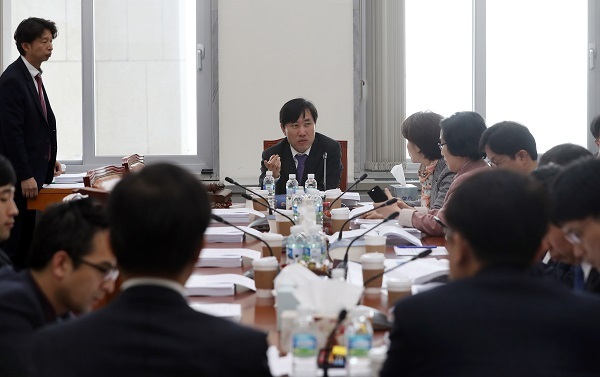South Korean lawmakers have failed to reach an agreement on reducing the maximum weekly working hours, leaving the matter up to the next administration.
Members of the National Assembly’s Environment and Labor Committee agreed that a proposed reduction to 52 hours from the current 68 hours would help improve working conditions and generate more jobs. But they failed to narrow their differences on some important details, such as weekend pay rates and a grace period to be granted to businesses.
Members of the National Assembly’s Environment and Labor Committee agreed that a proposed reduction to 52 hours from the current 68 hours would help improve working conditions and generate more jobs. But they failed to narrow their differences on some important details, such as weekend pay rates and a grace period to be granted to businesses.

The Labor Standards Act currently limits work to 52 hours a week -- 40 hours of regular work and 12 hours of overtime. But as the Labor Ministry has seen “the week” as excluding Saturday and Sunday, the legal limit is stretched to 68 hours in reality -- 40 hours during weekdays, 12 hours of overtime and 16 hours during the weekend.
The proposed revision was to plug this loophole by clearly stating in the law that the 52-hour cap is for the entire seven days of a week.
According to 2015 data from the Organization for Economic Cooperation and Development, South Koreans worked an average 2,113 hours annually, the third-longest hours among OECD countries. This marks 1.2 times more than the OECD bloc’s average of 1,766 hours.
On the other hand, labor productivity, measured as gross domestic product per hour worked, was far lower than the OECD average of $46.6, standing at $31.80 in 2015.
The push to curtail long hours and move to a more efficient work culture has faced strong resistance from local businesses, which fear that a rise in labor costs would chip away at their competitiveness in the global market.
Mindful of the worries, pro-business lawmakers of the parliamentary committee had insisted on granting companies up to two to four years of grace period.
Liberal lawmakers as well as labor unions, however, have strongly opposed the grace period for businesses, saying it is only an excuse for employers to break a law and further exploit workers.
Better work-life balance, enabled by shorter working hours, longer vacations or a flexible work system, is a key campaign pledge of major presidential hopefuls in the coming May 9 election, including front-runner Moon Jae-in.
South Chungcheong Gov. An Hee-jung, a liberal runner-up candidate, has pledged to introduce a sabbatical leave of one year for all workers who complete 10 years of consecutive work.
By Ock Hyun-ju (laeticia.ock@heraldcorp.com)
-
Articles by Ock Hyun-ju












![[Today’s K-pop] BTS pop-up event to come to Seoul](http://res.heraldm.com/phpwas/restmb_idxmake.php?idx=644&simg=/content/image/2024/04/17/20240417050734_0.jpg&u=)





![[KH Explains] Hyundai's full hybrid edge to pay off amid slow transition to pure EVs](http://res.heraldm.com/phpwas/restmb_idxmake.php?idx=652&simg=/content/image/2024/04/18/20240418050645_0.jpg&u=20240419100350)

